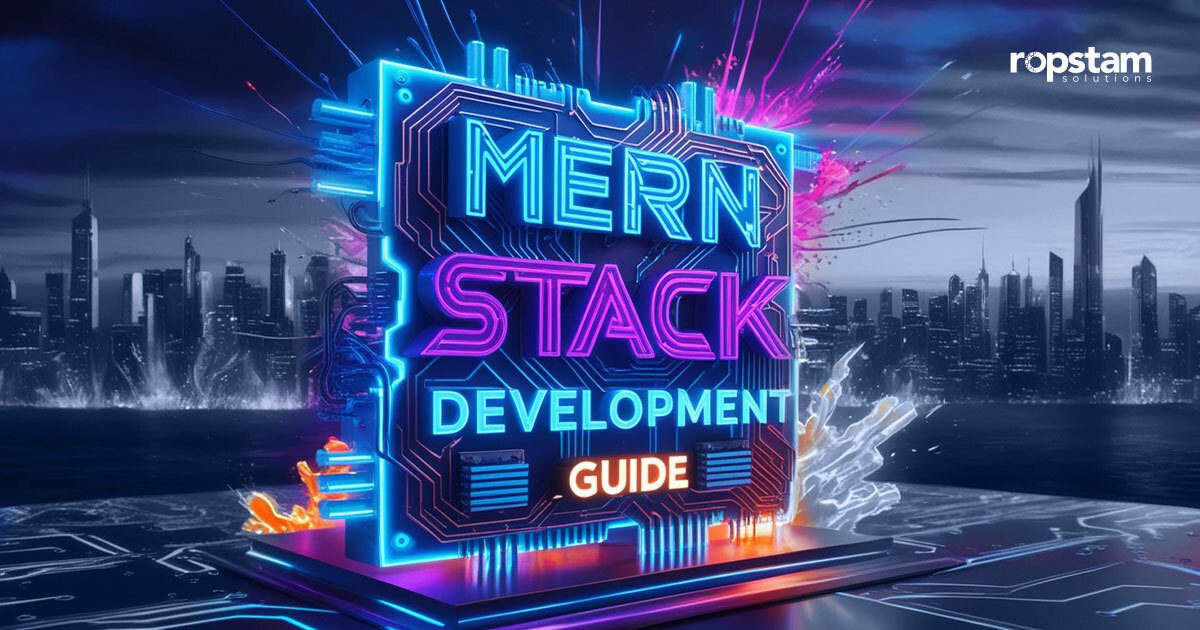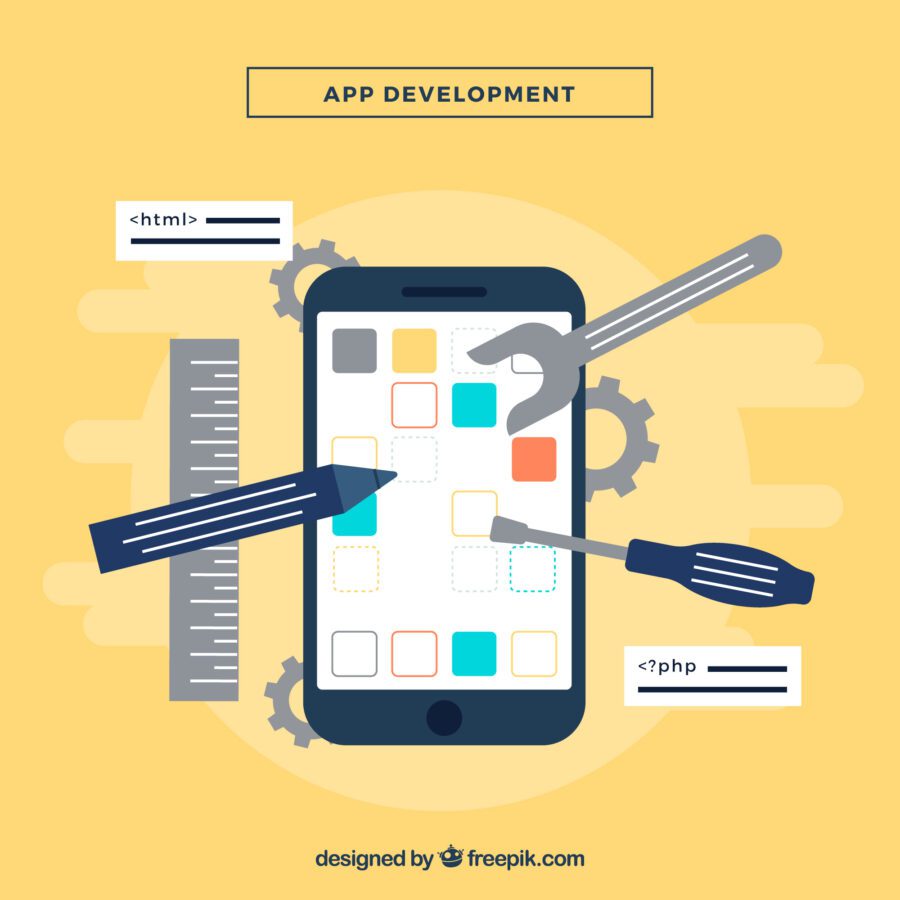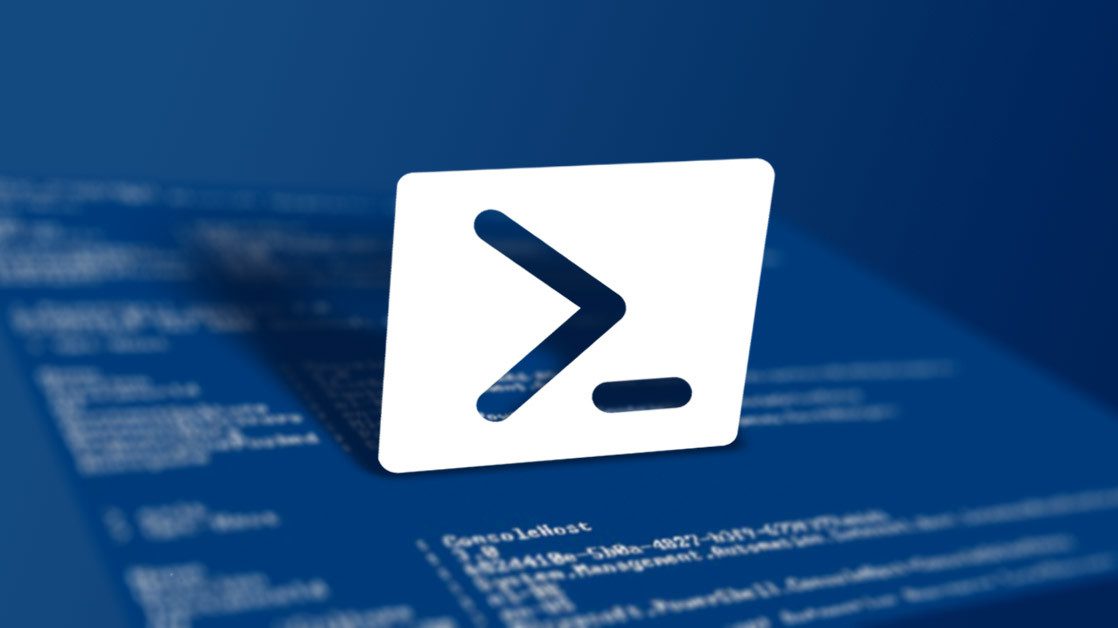MERN stack is a powerful web development framework combining MongoDB, Express.js, React, and Node.js. This JavaScript-based technology stack enables developers to build robust, scalable applications efficiently. It is pertinent to state here that by utilizing the power of MERN, you can create dynamic user interfaces and RESTful APIs, along with managing databases effortlessly.
The MERN stack offers several advantages in reference to front-end and back-end development such as its Model-View-Controller (MVC) structure simplifies the process of building applications and enhances reliability through a micro-services architecture, it streamlines development, allowing for faster problem-solving, feature addition, and product improvement, and multiple other benefits.
MERN stack developers are primarily responsible for managing the entire software development lifecycle. They write efficient, testable code that meets specific requirements to provide operational effectiveness. These full stack developers design and develop front-end web applications and utilize CSS methodologies and tools to build complete, responsive websites and web applications.
There are multiple web app development projects that new MERN developers can try to build in order to practice and test their front-end and back-end development skills such as social media dashboard, real-time chat application, and blogging website.
To make things easy for web developers, we’ll help them understand each component of the MERN stack, their synergies, and their role in web development in this comprehensive guide.
What is MERN stack?
In simple words, MERN stack is an advanced, efficient technology stack for building dynamic web applications by merging the power of MongoDB, Express.js, React, and Node.js. It would not be an embellishment to claim that this full-stack solution has gained significant traction among CTOs, tech leads, and business owners alike for its ability to create high-performance MERN-based web applications.
At its core, MERN is a harmonious blend of four JavaScript-based technologies. Let’s start by explaining each of these components:
MongoDB: Database tier
MongoDB is a flexible NoSQL database that excels in handling large volumes of unstructured data. Much to the interest of MERN developers, MongoDB’s schema-less nature allows for rapid development and easy modifications, making it ideal for agile projects. MongoDB’s horizontal scaling capabilities and rich query language additionally enable efficient management of complex data operations, which is crucial for modern, data-intensive applications.
Express.js: Server tier
A minimalist yet powerful back-end web application framework, Express simplifies the process of building robust APIs and web applications. Moreover, its flexibility allows developers to create everything from microservices to full-fledged web applications with ease.
React JS: Front-end
It is a declarative and efficient JavaScript library for building attractive user interfaces. React’s component-based architecture promotes code reusability and maintainability, while its virtual DOM implementation ensures optimal rendering performance.
The vast ecosystem of this front-end framework, including state management solutions like Redux and React Query, empowers developers to create sophisticated, interactive frontends that can handle complex application states.
Node.js: Server tier
Node.js is a powerful cross-platform JavaScript runtime environment that executes code outside a web browser. Its event-driven, non-blocking I/O model makes it exceptionally efficient for building scalable network applications. Its ability to handle concurrent connections makes it ideal for real-time applications, microservices architectures, as well as APIs that need to process multiple requests simultaneously.
Advantages of MERN Stack
The MERN stack’s unified JavaScript environment across the entire application stack offers several advantages:
- Simplified development process: Using a single language throughout the stack reduces context-switching and accelerates development cycles to a significant extent.
- Efficient data flow: The JSON-based data format used by MongoDB aligns perfectly with JavaScript objects, resulting in optimized data manipulation across the stack.
- Scalability: Each component of the MERN stack is designed to handle growth, making it an excellent choice for startups and enterprises alike.
- Large community and ecosystem: The popularity of the inherent MERN Stack technologies ensures a wealth of resources, libraries, and tools to support development.
- Cost-effective: Being open-source, MERN stack technologies are freely available, reducing licensing costs for businesses.
Challenges in MERN stack
The MERN stack comes with some challenges that developers must know so that they can use the stack effectively to build secure, strong, and scalable web apps.
- Limited support for older browsers. The MERN stack cannot support new browsers which may not completely supports the latest JavaScript features. This can lead to compatibility issues and affect the user experience.
- Security is always a concern. MERN developers need to keep up with patches and updates and follow secure coding practices to avoid vulnerabilities that could be exploited by cybercriminals.
- Non-availability of standardized development methodology. Although there are tons of tutorials and guides available, absence of a standardized development methodology can lead to inconsistencies in development practices and make it harder to maintain code quality across projects.
- Performance issues. Since the MERN stack relies heavily on JavaScript, which is mainly used for front-end development tasks, it might cause slowdowns in complex applications that require heavy computations. Then, web developers need to optimize their code and use the right techniques to keep performance up.
- Learning curve. Each technology in the MERN stack—MongoDB, Express.js, React, and Node.js—has its own syntax and concepts, which can be difficult for newcomers to master and integrate.
Role of MERN stack in front-end development and back-end development
The MERN stack provides a comprehensive solution for both front-end and back-end development, creating a flawless full-stack development experience. Here, we have explained how each component contributes to both sides of web development:
Front-end development with MERN – React JS
React: The cornerstone of user interfaces (UI)
React serves as the primary front-end technology in the MERN stack. Its role in MERN-based front-end development includes:
- Component-Based Architecture: React allows developers to build reusable UI components, enhancing code maintainability and reducing development time. This modular approach enables teams to work on different parts of the application simultaneously, improving overall productivity.
- Virtual DOM: This feature optimizes rendering performance by minimizing direct manipulations of the actual DOM, resulting in faster and more efficient updates to the user interface. The virtual DOM creates a lightweight copy of the actual DOM, calculates the most efficient way to make changes, and then updates the real DOM accordingly.
- State Management: React’s built-in state management, combined with libraries like Redux or MobX, enables efficient handling of complex application states and data flow. This is crucial for maintaining consistency across different components and managing user interactions effectively.
- React Router: This library facilitates client-side routing, enabling the creation of single-page applications (SPAs) with multiple views. It allows for dynamic routing, nested routes, and programmatic navigation, enhancing the user experience by providing smooth transitions between different sections of the application.
- Rich Ecosystem: React’s vast ecosystem includes libraries for form handling (Formik), UI components (Material-UI, Ant Design), and animation (React Spring), accelerating development and enhancing application functionality.
Back-end development with MERN – Node JS, Express JS, and MongoDB
Node.js: The server-side JavaScript runtime
Needless to say, Node.js forms the foundation of the back end in MERN stack development:
- Server Creation: Node.js allows developers to set up and run web servers, handling HTTP requests and responses. Its event-driven architecture makes it particularly efficient for handling multiple concurrent connections.
- Asynchronous Processing: Node.js’s event-driven, non-blocking I/O model excels at handling concurrent operations, making it ideal for scalable applications. This is particularly useful for applications that require real-time updates or handle a large number of simultaneous connections.
- NPM Ecosystem: The vast library of Node Package Manager (NPM) modules extends functionality and speeds up development. From database connectors to authentication libraries, NPM provides a wealth of tools to enhance back-end capabilities.
Express.js: The back-end web application framework
Express.js builds upon Node.js to simplify back-end development based on MERN:
- Routing: Express enhances the definition of routes for handling different HTTP methods and endpoints. It provides a clean, intuitive API for organizing application logic into manageable chunks.
- Middleware: It provides a robust middleware system for processing requests, handling authentication, and managing sessions. Middleware functions can perform tasks like logging, parsing request bodies, and error handling, making the development process more modular and maintainable.
- Static File Serving: It efficiently serves static files like images, CSS, and client-side JavaScript. Express can be configured to serve these files directly, reducing the load on the application server.
- Error Handling: Express.js provides a centralized error handling mechanism, allowing developers to manage and respond to errors consistently across the application.
MongoDB: The database layer
MongoDB plays a crucial role in data persistence and management for MERN projects:
- Document Storage: It stores data in flexible, JSON-like documents, allowing for easy modifications to the data structure. This schema-less nature of MongoDB makes it particularly well-suited for applications with evolving data models.
- CRUD Operations: MongoDB provides powerful APIs for creating, reading, updating, and deleting data. Its query language is expressive and allows for complex data manipulations directly within the database.
- Scaling: MongoDB’s horizontal scaling capabilities play a significant role in supporting growing applications and large datasets. It can distribute data across multiple servers, enabling applications to handle increasing loads and data volumes.
- Real-time Data: With features like change streams, MongoDB can notify applications of data changes in real-time, enabling the development of reactive applications.
Bridging front-end and back-end
The MERN stack excels in creating a flawless connection between front-end and back-end of web apps:
- RESTful API: Express.js creates APIs that React can consume, enabling efficient communication between front-end and back-end. What’s more is that these APIs can be designed to be stateless and cacheable, improving application performance and scalability.
- Real-Time Applications: The combination of React’s efficient rendering and Node.js’s event-driven architecture makes MERN ideal for building real-time, responsive applications.
- Full-Stack JavaScript: With JavaScript used across all layers, it’s a massive advantage for developers to work more efficiently across the entire application stack, reducing context switching and improving overall productivity.
What is the primary role of a MERN stack developer?
The job of a MERN stack developer encapsulates a wide range of tasks essential for building modern web applications. From designing and implementing user interfaces using React to creating scalable server-side logic with Node.js, MERN stack developers should also be familiar with database management using MongoDB and developing RESTful APIs with Express.js.
Not to mention that MERN developers are also expected to integrate front-end and back-end components to ensure smooth communication between server and client. They also utilize the full potential of this powerful technology stack to deliver dynamic web solutions in a professional environment.
How to become a full-stack MERN developer?
Attaining the status of a seasoned MERN developer demands a lot of practice and time. Focus on learning HTML, CSS, and JavaScript alongside React for front-end development and Node.js for server-side operations.
Not to mention that you must be proficient in RESTful principles and creating APIs as well. Try to acquire proficiency in MongoDB for database management. Also, don’t forget to practice full-stack development as much as possible by building real-world projects along with collaborating with peers.
All in all, continuous learning, staying abreast of advancements, and active participation in the developer community are pivotal to claiming the recognition of a professional full-stack MERN developer.
What MERN stack projects can you try as a web developer?
Here are some of the best MERN stack projects that can help you boost your skills as a web developer:
- Social Media Dashboard
- Real-Time Chat Application
- Blogging Website
- Learning Platform
- Fitness Tracking Website
MERN stack projects completed by Ropstam
Ropstam is a well reputed web development company and has developed tons of MERN stack projects. At Ropstam, we have a dedicated team of MERN stack developers with years of experience in this field. Underlining their expertise and our commitment to client satisfaction, here we have compiled a list of a few of the most successful MERN stack projects we have successfully delivered:
- Tagmarshal
- Cloud9
- NeuroAscent
- Synshift HMS
Collaborate with Ropstam Solutions to hire MERN stack developers
To summarize, the MERN stack offers a powerful, unified JavaScript ecosystem for full-stack development. From MongoDB’s flexible data storage to Express.js’s robust backend framework, React’s dynamic user interfaces, and Node.js’s efficient server-side operations, MERN provides a comprehensive solution for modern web applications.
Looking for a reliable and trustworthy MERN Stack development company? Look no further than Ropstam Solutions because we boast an award-winning team of MERN full-stack developers. With more than a decade of experience in the field of software development, we have the expertise to bring your vision to life. Share your project details with us today and let us develop a top-tier web application for you!















